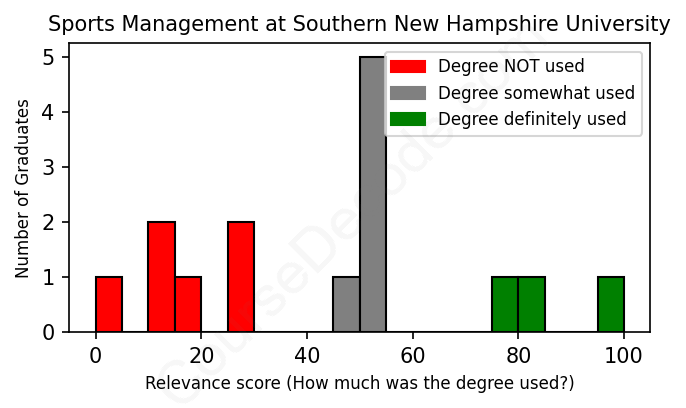
First, some facts. Of the Sports Management graduates from Southern New Hampshire University we've analyzed , here's how many have used (or NOT used) their degree in their career:

These are estimates based on AI analysis of 15 LinkedIn profiles (see below).
The verdict? Bad. Overall, with an average relevance score of 43%, Sports Management graduates from Southern New Hampshire University have a substantially lower likelihood (-24%) of finding work in this field compared to the average graduate across all fields:
And for comparison, here's the chart for all profiles we've looked at across all degrees.
Also, after graduating, only 20% of these graduates have pursued further education other than another Bachelor's degree (such as a Masters degree or other), compared to the average across all profiles of 35%. This suggests a Bachelors degree is enough for most Sports Management graduates, and it's normal to look for work straight after graduation.
See the details:
|
Relevance score: 25% We think this person has NOT gone into a career related to their degree. We think this person has NOT gone into a career related to their degree.
DEGREE INFOGraduated in 2018 from Southern New Hampshire University with a Bachelor of Science - BS in Sports Management. No other secondary education since. JOB HISTORY SINCE GRADUATIONSecurity Officer Securtias Apr 2018 - Nov 2019 Delivery Driver  Uber Oct 2019 - May 2022 Security Officer  Churchill Downs Incorporated May 2020 - Jun 2022 Security Officer  GardaWorld Jun 2022 - Present ABOUTNo information provided. |
The top 10 most common jobs done by the graduates we've analyzed (ranked most common to least) are:
Based on the job titles of individuals who graduated with a degree in Sports Management from Southern New Hampshire University, it seems like there’s a mix of relevant and unrelated roles in their career paths. The most common positions they held revolve around coaching, operational management in sports-related facilities, and various roles within organizations like the YMCA, where they utilized their knowledge of sports programming and community engagement. Positions such as Assistant Baseball Coach, General Manager at a baseball facility, and Sport Camp Director are solid examples of roles directly tied to the skills learned in a Sports Management program, allowing graduates to leverage their training in real-world sports settings. However, there are also a significant number of graduates who found themselves in completely unrelated fields, such as law enforcement, food service, and retail, which don’t utilize their specific education in sports management.
Overall, while many graduates found roles that align with their degree, others ventured into areas that lack direct relevance to Sports Management. Many of the positions that might seem tangential, like customer service or even some operational roles, could involve transferable skills like leadership and management. However, the clearer connection to the degree—like coaching or sports facility management—was certainly less common. It highlights that while a Sports Management degree can prepare one for various jobs, not every career path taken by its graduates directly relates to the sports industry.
Here is a visual representation of the most common words in job titles for Sports Management graduates (this is across all Sports Management graduates we've analyzed, not just those who went to Southern New Hampshire University):

When looking at the career paths of graduates from Southern New Hampshire University's Sports Management program, it seems like their trajectories can be quite varied. Many of the early jobs after graduation appear to be a mix of related opportunities in the sports sector, such as coaching and operating sports facilities, and those that venture into completely different fields, like law enforcement and retail management. For instance, a number of graduates starting out in roles like sales management at sports organizations or coaching positions suggest that they do have a foothold in the sports industry initially. However, it’s notable that some switch to unrelated fields relatively quickly, with jobs like administrative roles or even positions in the fire department popping up within just a few years after graduation.
Fast forward five to ten years, the trend looks similarly mixed. While a handful have established themselves in sports-centric roles, with steady positions at organizations like the YMCA or coaching teams, others have drifted away and found success in entirely different industries. Some graduates eventually find stable roles as administrative staff or in sales positions outside the sports arena. It appears that for some, the degree may not directly lead to a long-term career in sports management, which can be a reality check for those hoping for a straightforward journey into the sports world. Overall, while some graduates are thriving in relevant careers, a significant number have found themselves in unrelated jobs, reflecting a diverse, and at times unpredictable, post-graduation landscape.
Honestly, a Bachelor’s degree in Sports Management at Southern New Hampshire University isn't super tough, especially when you compare it to some other majors out there. The program is designed to be accessible, with a mix of online and on-campus options, which definitely makes it easier to fit into your schedule. You’ll cover a variety of topics like marketing, ethics, and event management, but as long as you stay organized and keep up with your assignments, you should find it manageable. A lot of students find it engaging because they're passionate about sports, so it tends to be less about memorizing dry facts and more about real-world applications. Overall, if you're into sports and are willing to put in the effort, you’ll probably find the experience pretty rewarding and not too overwhelming!
Most commonly, in the LinkedIn profiles we've looked at, it takes people 4 years to finish a Bachelor degree in Sports Management.
Looking at these graduates from Southern New Hampshire University, it's kind of a mixed bag when it comes to how well they've done financially. The ones who went into positions like police officers and teachers might not be raking in big bucks right away, especially in the early stages, but roles like Detectives or General Manager can offer some decent salaries down the line. On the other hand, graduates who transitioned into management positions or specialized roles, like those at Warby Parker and the USA Baseball Facility, likely have a better chance of hitting higher pay scales. Still, a lot of these jobs, especially in non-profit or coaching positions, can be tough on the wallet, but they might make up for it in passion and love for the game. Overall, it seems like while some might be doing okay, there are definitely a few who might be hustling to make ends meet.
Here is a visual representation of the most common words seen in the "about" section of LinkedIn profiles who have a Bachelor degree in Sports Management (this is across all Sports Management graduates we've analyzed, not just those who went to Southern New Hampshire University). This may or may not be useful:

Here are all colleges offering a Bachelor degree in Sports Management (ordered by the average relevance score of their Sports Management graduates, best to worst) where we have analyzed at least 10 of their graduates: